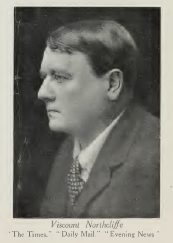On a first reading of Lord Northcliffe’s Newspaper Millionaires, a pamphlet published by the press baron shortly before his death in 1922, I was struck by his concern for the welfare of the printers who worked on his newspapers. ‘In the last thirty years’, he explained, ‘the status of the British printer has greatly improved. He is one of the most highly skilled craftsmen we have. … I rejoice at his better state.’
When his fellow millionaires on the Newspaper Proprietor’s Association (NPA) proposed a reduction in the wages of printers on metropolitan daily newspapers, Northcliffe opposed it, an action that ‘was fiercely resented in a certain quarter’. In a meeting with Northcliffe, a representative of one of the newspaper owners described the wages of the printers as ‘preposterous’: ‘Some of these men have motor-cycles and sidecars; more than one of them drives a motor-car.’ ‘Why shouldn’t they?’, Northcliffe replied. ‘Our men are at least as skilled as the American and the other foreign workers. If American printers are able to own Fords why shouldn’t ours? British newspapers are just as prosperous as at any time in their history.’
Lord Northcliffe as a champion of workers' rights and standards of living was not something I was expecting! His pamphlet jarred completely with my preconceptions of the press baron, even if it was couched in a jingoism about ‘foreign workers’ that seemed more characteristic and in keeping with his position as Director of Propaganda in the First World War. Surely there was an ulterior motive? Why would a renowned conservative and ruthless entrepreneur — one who had revolutionised the capitalist and popular press in Britain — risk his relationship with millionaires for the sake of the welfare of his printers?
The answer to this question is circular and appears contradictory. Northcliffe insisted on the maintenance of high wages because he was a ruthless entrepreneur. As the wages of newspaper printers were industry wide — the product of agreements between the NPA and the print unions — Northcliffe’s defence of high wages would imperil his rivals and threaten to put them out of business. He championed workers’ rights and standards of living only so far as it suited his own interests. It was a ruse to consolidate and expand his own press empire.
In retrospect, this tactic of driving up the costs of production can be seen as one of the fundamental reasons for the collapse of hundreds of newspapers in Britain in the run up to the Royal Commissions on the Press after the Second World War: smaller owners simply could not afford the inflated wages and wanted as much as possible to avoid the prospect of printing strikes. It has been far more fashionable, however, to explain the political economy of the press through its dependence on advertising revenue; the complex relationship between printers, their unions, newspaper managers and proprietors has been largely overlooked.
The tactics of Northcliffe also provide an insight into how the most successful press barons have outmanoeuvred their rivals (and ultimately the printers themselves) through entrepreneurial camouflage and cunning. In my next blog, published to coincide with the 30th anniversary of the start of the Wapping Dispute in January, I will examine the chicanery of a media mogul who has developed a reputation even more infamous than that of Northcliffe himself: Rupert Murdoch.



